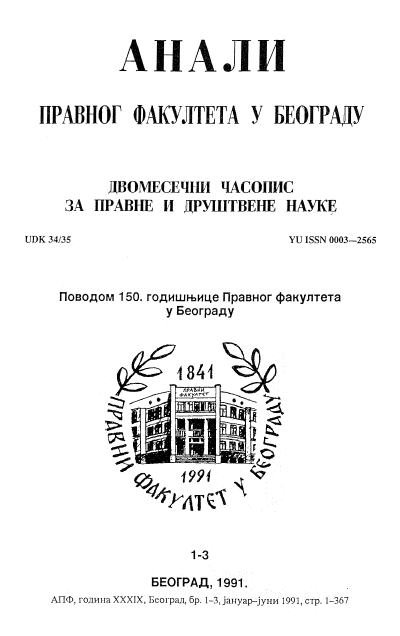ОДНОСИ ИЗМЕЂУ ПОЗИТИВНОГ И ПРАВЕДНОГ ПРАВА
RELATIONSHIP BETWEEN THE POSITIVE AND JUST LAWS
Author(s): Božidar MarkovićSubject(s): Philosophy of Law
Published by: Правни факултет Универзитета у Београду
Keywords: Philosophy of law; Positive law; Just law; Justice
Summary/Abstract: Every law has first of all to be just, but in reality this basic principle is not always applied. The author inquires into the causes of that phenomenon, into relationships between the positive and just laws and into the issue of the possibility to eliminate or attenuate this discort between the two. In order to answer the above questions one should know first of all what is justice. Justice appears in two aspects, as a formal justice ans as substantive justice. The formal one menas the principle of equal treatment of equal matters, namely dissimilar treatment of dissimilar matters, but in proportion to their dissimilarity. Substantive justice contains, on the other hand, a human criterion of the value of matters, namely a judgment on equal matters and on the degree of dissimilarity. This criterion is, however, very changeable since human spirit is not able tzo know the absolute truth and thus the absolute justice. Because of that, human justice is not only changeable bu also, in terms of value, it is a relative category. The other significant factor influencing the relationship between the positive and just laws is the duality of the legal phenomenon. The law is, namely, created, by the society and by the state and these two sources of law are rather frequently controversial. The third reason for the discord between these two kinds of law is found in the static element of the positive formula which is opposed to the dynamics of the substasntive law. Positive rule cuts off by its formulation the course of evolution, while the social contents of the formula is constantly changing. All these inevitable conglicts should be attentuated ba a legal method - a combination of logical reasoning according to legal texts and sociological observation of social facts in full is the existence in the state of complete freedom of establishing and expressing of opinions concerning the substance of the relative and changeable substantive justice. Because of that, the differences between the positive and just laws in a democratic state are the smallest. Expressed conceptions are thus an expression of rational scepticism which originates out of limited possibilities of human perception and knowledge, but also out of the nature od the very legal phenomenon and the relevant techique.
Journal: Анали Правног факултета у Београду
- Issue Year: 39/1991
- Issue No: 1-3
- Page Range: 202-210
- Page Count: 9
- Language: Serbian

